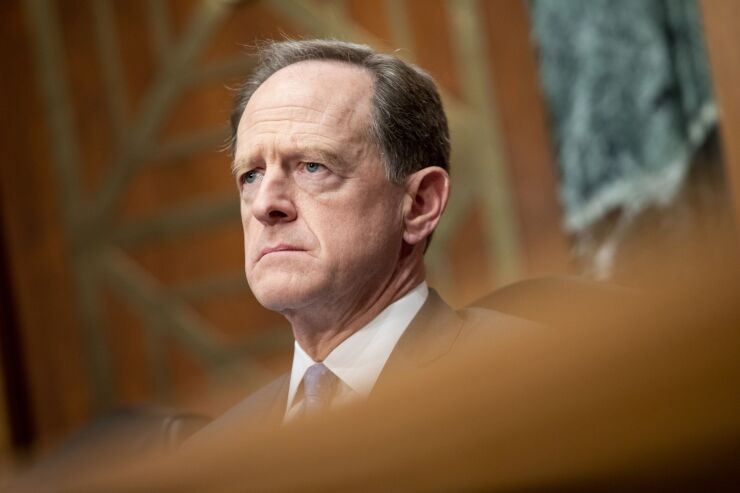
Former Sen. Pat Toomey wants a federal judge to disregard one of the Federal Reserve's claims in a lawsuit over access to its payments system.
In a brief submitted to the U.S. District Court in Wyoming this week, Toomey said
"This Court should reject any arguments attempting to misread the Amendment as opining, in any way, on the substantive discretion of either the Board, or the Reserve Banks, over the requirements for, or the granting of, master accounts," Toomey's filing said.
He added that the Fed was well aware of the legislation's intent, noting that officials with the central bank urged him to drop the matter last year.
"[The Federal Reserve] Board opposed the Amendment, maintaining that it could provide transparency voluntarily and without further legislation," Toomey's lawyers wrote in his filing. "[Fed] Chair [Jerome] Powell and other senior officials at the Board contacted Senator Toomey and legislative staff to express their concerns about the Amendment."
The Fed declined to comment on Toomey's filing.
The legislation in question is last year's National Defense Authorization Act, into which Toomey inserted a provision requiring the Fed to create and maintain
Toomey said the intent of the provision was clear: to force transparency requirements on the central bank's handling of master accounts, which provide a single point of access to all of the Fed's financial services, including payment clearing between institutions.
The impetus for the legislation was the Fed's unwillingness to share details about Federal Reserve Bank of Kansas City's decisions to deny, then grant, then revoke, an account to the Colorado-based financial firm Reserve Trust. The issue arose during the Senate Banking Committee's confirmation hearing for the Biden administration's original nominee for Fed vice chair for supervision, Sarah Bloom Raskin, a former Fed board member who served on Reserve Trust's board of directors.
"The Amendment was drafted in response to the Board's, and Kansas City Fed's, refusal to address repeated Senate inquiries into the handling of Reserve Trust's master account application," Toomey's attorneys wrote. "It was enacted solely as a disclosure measure, meant to ensure greater transparency as to which institutions hold and seek master accounts."
The Fed, which is
Specifically, it argues the law's reference to master accounts being "rejected" as confirmation that the Fed has discretion over which depositories can have master accounts. Also, it states, the fact that Toomey's provision refers to them as "reserve bank master accounts," confirms that the Fed's 12 regional banks have authority over who can have access. Custodia's lawsuit challenges both those stances, arguing that all state-chartered banks are entitled to master accounts and granting them or not is ultimately up to the Fed's Board of Governors in Washington, D.C.
Toomey, who filed his brief "in support of neither party," said he and his staff purposely tried to avoid taking a stance on matters relevant to the Custodia case. He also noted that the language about master accounts being located at reserve banks was added at the request of Fed officials who, at the time, said the specification would not "carry any substantive or policy weight."
In his filing, Toomey said if he wanted to solidify the Fed's position on a subject as important as master account access, he would have done so through more formal means, rather than as an add-on to a wide ranging spending bill.
"If, as the Kansas City Fed argues, Congress intended to delegate to the quasi-private Reserve Banks, or recognize a previous delegation of, primary authority over the important issue of approving master accounts, this would have been no minor matter," the filing notes. "Congress would not have hidden such a weighty statement on the balance of power within the Federal Reserve system within two definitional words — especially ones only included after being offered by the Board staff as merely 'technical' suggestions to address operational matters, and not as sources of authority or to settle any disputed matters about master account approval authority or discretion."






